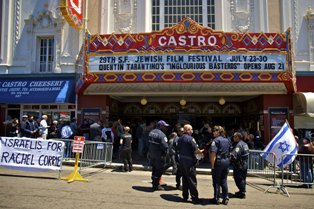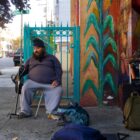 |
| Protesters outside the Jewish Film Festival. Photo By Ed Ritger/The Public Press. |
When the audience shuffled out of the Castro Theatre and the protesters headed home, the polarizing debate surrounding the July 25 screening of "Rachel” at the San Francisco Jewish Film Festival was not over.
Rather than argue about the appropriateness of the film at the festival, which ends Aug. 10, the Bay Area Jewish community is engaged in another soul-wrenching internal conversation.
“This is old news in a certain way; it’s like deja vu for the millionth time,” said Deborah Kaufman, who conceived and founded the festival in 1980 and was its executive director until 1994.
“Great art is often controversial or political,” said Kaufman, who is working on her first documentary. "A festival should not just be celebrating Jewish culture, it should be looking at all sides of the Jewish identity.”
In the course of its 29 seasons, the festival has explored the boundaries of Jewish identity, hitting a few bumps along the way. In 1988 sponsors cut funding after the festival showed “Talking with the Enemy,” a documentary about Israeli and Palestinian journalists who meet when such contact was banned.
The festival hit another big bump this year by casting a spotlight on the occupation of the West Bank and Gaza, and the conflict within Israel.
In the weeks leading up to the film, controversy swirled because of the festival’s decision to include Simone Bitton’s documentary about the death of 23-year-old American peace activist Rachel Corrie, who was killed while trying to halt the destruction of Palestinian homes in Ramallah by an Israeli army bulldozer.
And it was the invitation of Corrie’s mother, Cindy, for a question-and-answer session after the film that infuriated some corporate sponsors and alienated a portion of the Jewish community.
At the Saturday afternoon screening, groups of protestors and demonstrators mingled outside of the theater. They included people holding a bright pink banner emblazoned with “Free Gaza” and Bay Area Women in Black.
“We wear black as a sign of mourning for the innocent people killed on both the Israeli side and also the other side,” a member of the group said.
Outside, the police stood idly by. Inside, the debate heated up.
In comments proceeding the film, festival executive director Peter Stein apologized “not for the film or for the invitation of Mrs. Corrie, but for opening up a very, very painful moment in our community that I think reveals far more about the distance we have to go as a diverse community in addressing serious differences.”
The film, which has screened at festivals from Berlin to New York, received a standing ovation. And then it was time to hear from the other side.
At the last minute, the festival added a second speaker to the program, Michael Harris. As a founder of the grassroots advocacy group SF Voice for Israel, his opinions reflected the organization’s mission to defend Israel’s right to exist as a Jewish state.
Although he did not question the suffering of a parent who must bury a child, he spoke at length about the context missing from the film — about the deaths of those he called "Israeli Rachels," young people who paid with their lives "simply for being Jews living in the only Jewish country in the world."
"All we really know is that Rachel Corrie tragically died when she intentionally put herself in harm’s way during an (Israeli Defense Forces) counter-terrorism operation in the Gaza Strip," Harris said to boos and heckling.
"This episode should lead to some serious and thoughtful discussion about the role and responsibility that a Jewish film festival should take within our community. A Jewish film festival should not be presenting a film and speaker that demonize Israel," he told an audience that largely disagreed with him.
Cindy Corrie had a calm presence on the stage she shared with Stein.
"There’s a lot of misinformation available," she said. "I think a lot of people go and grab bits of information. We don’t always dig real deeply."
She echoed Stein’s earlier sentiments that her daughter’s death has served as a catalyst for a deeper conversation.
"It has a whole lot less to do with me and with Rachel than it does to do with the discussion that is happening within the Jewish community," Corrie said, "which I think is a very healthy discussion.”
Foundations assail ‘egregious errors’
Two prominent Bay Area philanthropies could not have disagreed more.
In a rare public display of political clout, the Koret and Taube foundations — major local donors that also fund the festival — issued a statement that condemned what they called "three egregious errors" — the film, its co-sponsors and the decision "to invite Cindy Corrie into our community." The statement also said the foundations "have made no decision regarding future funding" of the festival.
"As staunch champions and allies of Israel, the Koret and Taube foundations do not support any organization that promotes or provokes anti-Israel sentiment; nor do we provide funding to any organization whose mission runs counter to our position," the statement said. “In this case, the San Francisco Jewish Film Festival has aligned itself with the wrong side."
Defenders counter ‘intolerant, reactive actions’
Defenders of the film launched an e-mail campaign to counter the attack, even swaying publications that had run scathing editorials and supported a boycott to call for a truce.
"Regardless of what you or I think of this film, we should all be greatly disturbed by the intolerant and reactive actions of some members of the community," an email from a festival board member read. "Once again (for this has happened many times over the years), if the Festival programs anything that is in any way critical of Israel, there are people who start hurling condemnation at the Festival."
“The decision to show a controversial film and have a dialogue with an unpopular guest should not subject an organization to boycott, but should be celebrated and supported in a pluralistic, democratic Jewish community, even by those who disagree. These are core Jewish values."
A history of exploring complex issues
It’s not the first time that the festival has found itself on the defensive with Bay Area Jewish foundations for screening films that may not always portray Israel or Jews in an entirely favorable light.
 |
| The movie "Rachel" has sparked strong debate. Photo by Ed Ritger/The Public Press. |
From its inception, the festival has presented controversial films about the Palestinians, and hosted panel discussions featuring Israelis and Palestinians to explore the plurality of such complex and sensitive issues.
The mission of the festival was and is to be an "intervention" in the Jewish community, Kaufman said. It was borne of a desire to provide a forum for issues that had been marginalized by the mainstream and “to represent voices that hadn’t been heard.”
In 1988, “Talking with the Enemy” was one such voice. It portrayed two journalists — one Israeli and one Palestinian — who wrote to each other and later met face to face at a time when such interactions were illegal.
“A lot of funders called and said that they were going to withdraw funding if we showed it,” Kaufman said, adding that Koret was among them. She said that the following year there was a dip in funding from Koret, in what amounted to "a slap on the wrist," but in later years funding was restored to previous levels and even increased slightly.
For a couple of years after, she said, the organizations reduced funding, although they didn’t have much political sway over the curatorial freedom of the festival. But the net result was a gain from new donors outside the Jewish community.
“The festival is designed to appeal to a much larger population than a few Jewish donors on the Peninsula,” Kaufman said. She noted the foundations are interested in the festival’s dozens of other films about Israel, even though there is the occasional film they staunchly protest.
A representative from the Koret Foundation said that the foundation’s contributions "had been fairly consistent" in the years following "Talking with the Enemy."
There is no question that the festival has been successful since its inception, growing to become the largest film festival of its kind in the world.
“There is clearly more support than there are detractors,” Kaufman said, attributing some of that growth to the "unique" composition of the Bay Area Jewish community in terms of its political views on the state of flux of Israel.
While it is uncertain whether the Koret and Taube foundations will contribute to the festival in coming years, Stein said that negotiations still need to happen.
However, Susan Wolfe, Koret’s director of grantmaking programs and communications, said the foundation stands by its initial statement. She did not comment on whether the foundation was pursuing negotiations.
Selecting a program of artistic works that reflects the mission of the festival and keeps donors happy is “a constant balancing act,” Stein said.
‘How do we build bridges?’
Controversy surrounding the screening of “Rachel” was less about whether the film belonged at the film festival than about the need for a conversation within the larger Jewish community or communities.
“How do we build bridges between our own people, when if we can’t see a film, or listen to a conversation or listen to a speaker without calling out accusations that someone is an anti-Semite or that someone is out to destroy the state of Israel?” Stein asked during an interview with The Public Press.
“Then we have our own work to do before we start calling on others to negotiate settlements in the Middle East,” he said. “Frankly, I think we have a lot of internal work to do.”
The Bay Area Jewish community is an unusual community in terms of Jewish identity in the United States, according to Marc Dollinger, professor of Jewish Studies at San Francisco State University.
With what he called the “highest levels of assimilation and the lowest levels of synagogue participation” in California, Dollinger said that aside from those people who identify with the extreme positions on Israel and Palestine, the Bay Area Jewish community represents a “national center for ambivalence on Zionism in the country.”
Although the Koret and Taube foundations made their admonitions publicly known, Dollinger said that most of the Bay Area Jewish community are not affiliated with or represented by the foundations.
“Moments like this film are opportunities” for members of those organized communities who do identify with the foundations to articulate their viewpoints, he said.
Dollinger agreed that the film was a spark for a conversation about Jewish identity that needs to happen in the Bay Area community, but he pointed out that the groups that participated in the film and related events were only a fragment of the larger, more diverse community.
“This film activated those on the margins, but the discussion has to happen in the mainstream,” Dollinger said. “It will be the challenge of the film festival to provide that environment in the future for the discussion."










